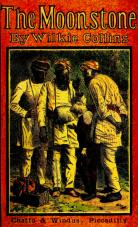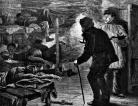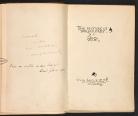The Orient in The Novel, Dorian Gray: Imperial Gothic and Fin De Siècle
Created by Adiam Woldu on Wed, 12/08/2021 - 20:44
The Picture of Dorian Gray is grounded in the imperial Gothic, which is revealed through the antagonistic function of the Orient within the novel. After an investigation into how the novel employs conventions, and background on the function and uses of the genre in Victorian literature, I point the reader to the anxiety that permeated fin de siècle Britain: The arrival of the colonies in the London metropolis, and the advent of opium dens, subjecting the Englishman to a complete degeneration.
Timeline
Chronological table
| Date | Event | Created by | Associated Places | |
|---|---|---|---|---|
| circa. 1868 |
The MoonstoneIn 1868, Tinsley Brothers published the first edition of The Moonstone by Wilkie Collins (1824-1889), which became known as the precursor of the modern mystery novel. Rachel Verinder, a young English woman, inherits a sacred Indian diamond from her corrupt, opium-addicted uncle who stole the gem from Brahmin priests while he served in the British East India Company. The cursed diamond introduces numerous forms of loss, dissolution, and death into the lives of the English characters. |
Adiam Woldu | ||
| 31 Jul 1868 |
The Pharmacy Act of 1868By limiting the sale of opium to qualified pharmacists, the British government attempted to bring the rapid use of opium under control. The addictive qualities of the drug were linked to the Chinese population in the East End. In 1883, Methodist Recorder published the article, “Opium Smoking in London” by Rev. George Piercy, in which he urged the Victorian reader to examine the changes in their metropolis, with then “…six or eight schools for opium smoking, the presiding spirits in each being hardened opium-sodden Chinamen, confirmed smokers themselves, and earning their livelihood by teaching others also…” |
Adiam Woldu | ||
| Jul 1890 |
The Picture of Dorian GrayIn July 1890, Lippincott’s Magazine published the first edition of The Picture of Dorian Gray by Oscar Wilde (1854-1900). The second edition was published in April 1891 by Ward, Lock and Company. The second edition includes an additional seven chapters, and in Chapter 16, Dorian Gray travels into the East End, straight to the contaminated opium dens. |
Adiam Woldu |



